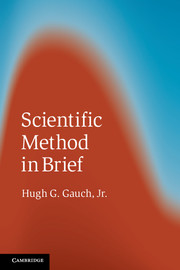Book contents
- Frontmatter
- Contents
- Foreword
- Preface
- 1 Introduction
- 2 Four bold claims
- 3 A brief history of truth
- 4 Science's contested rationality
- 5 Science's presuppositions
- 6 Science's powers and limits
- 7 Deductive logic
- 8 Probability
- 9 Inductive logic and statistics
- 10 Parsimony and efficiency
- 11 Case studies
- 12 Ethics and responsibilities
- 13 Science education
- 14 Conclusions
- References
- Index
12 - Ethics and responsibilities
Published online by Cambridge University Press: 05 November 2012
- Frontmatter
- Contents
- Foreword
- Preface
- 1 Introduction
- 2 Four bold claims
- 3 A brief history of truth
- 4 Science's contested rationality
- 5 Science's presuppositions
- 6 Science's powers and limits
- 7 Deductive logic
- 8 Probability
- 9 Inductive logic and statistics
- 10 Parsimony and efficiency
- 11 Case studies
- 12 Ethics and responsibilities
- 13 Science education
- 14 Conclusions
- References
- Index
Summary
This chapter presents an exceedingly brief account of philosophical and professional ethics. It is essential and unavoidable for science and technology to be guided and constrained by an ethical vision.
The main topic, having the longest section, is science's professional ethics. All position papers on science recognize science's ethics as an essential item in the science curriculum. But that section needs to be preceded by a shorter section on philosophical ethics, which provides the broader context needed to make professional ethics meaningful.
Philosophical ethics
The ideas on philosophical ethics presented here are drawn from three exceptional books, two old and one recent: Caldin (1949), MacIntyre (1988), and Sandel (2009). Edward Caldin was a lecturer in chemistry at the University of Leeds. Alasdair MacIntyre has taught philosophy at the University of Oxford, University of Essex, Notre Dame University, Duke University, and several other universities, and is a past president of the American Philosophical Association. Michael Sandel teaches a large and popular course on ethics at Harvard University.
- Type
- Chapter
- Information
- Scientific Method in Brief , pp. 220 - 233Publisher: Cambridge University PressPrint publication year: 2012

